I hope you saw a BookNotes column we did a week or so ago lamenting that when we had to furlough some of our staff and we got swamped with complicated mail order bookselling in the worst of the quarantining, we didn’t have the capacity to celebrate important new releases of last Spring and Summer. I announced in the important BookNotes column some of those I really had intended to promote back then, and figured “better late than never.” Please take a look at that BookNotes (they are all archived at our Hearts & Minds bookstore website) and see that list of some of the most important books of the past six months. Better late than never.
And, so, we continue on, naming books that we have big stacks of here; we would have shared these at our off site events, the conferences, retreats, and gatherings we had intended to serve with big book displays a season or so ago. We’ve lost almost half our income having these gigs all (necessarily and properly) cancelled, but we remain steadfast in our calling to tell you about good books.
If you like what you see, maybe you could share it with others, helping us get the word out about these authors and titles and our online sales.
Be sure to tell people that they can order on line, easily, or call the shop.
Our order form page (SEE THE LINK AT THE END OF THIS COLUMN) is certified secure so you can enter credit card information safely. We will reply promptly to confirm everything.
Please tell us how you’d like your order shipped — USPS Media Mail is cheaper and slower; USPS Priority Mail is more costly but much quicker. Feel free to ask for more details about your own order if you’d like. We’re happy to help.
So, here are some more important releases that are fairly recent, but that we might have promoted more vigorously when the first came out if we had been able. These are not to be missed and we salute the authors and publishers who work to write and release these kinds of great resources for us all. Buy some books, folks! Not brand new, but recent. Let’s not let the Covid virus ravage our authors and publishers (and booksellers.) All are 20% off.
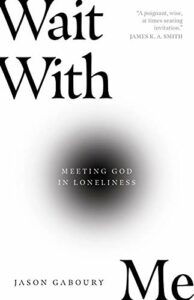 Wait With Me: Meeting God in Loneliness Jason Gaboury (formatio/IVP) $16.00 – OUR SALE PRICE = $12.80
Wait With Me: Meeting God in Loneliness Jason Gaboury (formatio/IVP) $16.00 – OUR SALE PRICE = $12.80
It was early in the quarantining, shelter-in-place season when this brilliant book entered our store and nearly every day I wished I had the capacity to write about it and send it out via our BookNotes newsletter. Few books seemed as urgent, as apropos, as needed. Yet, the season drug on and we were working 15 hours straight keeping up with our mail out orders without our team on board. As you know, I didn’t write much, save an Easter blog or two. And so, now, truly, in the “better late than never” category is this winner: a book written before any lock-downs and stay-at-home orders, before the big increase in loneliness among many of us. I know many who knew of this wise and thoughtful work commented on how it was very important resource for many of us.
Of course, Wait With Me was not written with any Covid-caused loneliness and could not have anticipated folks exiled from work and church and entertainment and extended family, but it nonetheless was written about the nature of our relationship with God whenever we are lonely. That statistics were tilting strong in this direction way before Covid — curiously, one of the best books on this epidemic of loneliness is one I wrote about just before the health crisis hit — Three Pieces of Glass: Why We Feel Lonely in a World Mediated by Screens by the brilliant pastor and social critic Eric Jacobsen (Brazos Press; $19.99.) The three pieces of glass are, as I explained in my BookNotes rave review, are the TV screen, the computer screen, and the windshield from our cars. These social realities facilitate a culture of individualism and autonomy and loneliness.
Readers will be glad that Jason Gaboury — a regional ministry director with InterVarsity Christian Fellowship — understand these things. He gets the big picture and isn’t afraid to talk about our culture and social trends and the habits and practices that erode our experience of authentic community. He cites very contemporary critics and novelists. He’s aware of important ways things like racism and sexism effect our sense of self and may help contribute to alienation and loneliness. He is also part of a robust, liturgical worshipping community and is an Anglican friar, skilled in the arts of spiritual direction, with deeper awareness of deeper truth; he realizes, as his own 70-something spiritual director told him, “To be human is to be lonely.” Ahh, perhaps, Covid or no, screens or not, we need Gaboury’s insights about the deepest holes in our heart and the deepest hurts in our souls and the realities of our human condition. Which is to say, this book is walking ground along with Merton’s No Man Is an Island and perhaps Henri Nouwen’s Reaching Out or The Wounded Healer. Perhaps we need not to run from our inner anguish or our relational sorrows but push on to know God better.
This is not cheap talk or pious sentimentality. It could be the way some writes who say this come across — “Don’t worry if you’re lonely or sad, just be with Jesus,” – with a smiley face or praying hands emoji. No. This it isn’t quaint or cheap, but it does, yet, profoundly move in that direction, naming and exploring how in our own suffering we find a greater sense of our oneness with Christ’s suffering and thereby our actual humanness. As David Booram (author of the lovely and good When Faith Becomes Sight ) writes, Gaboury in inviting us to this “unwelcomed, unavoidable, yet potentially sacred meeting place.” It calls us to what author Noemi Vega Quiñones (coauthor of Hermanas) called “vulnerable connection.” With With Me is a beautifully written book, wise and helpful and cool, even if pushing us to some serious self reflection in our often anguished solitude. (He is, by the way, happily married with children and has a job that would be an extraverts dream. And yet.)
This book has gotten great reviews from all sorts of folks of different races, men and women, those married and singles, older and younger. Many think it’s excellent.
“This, thankfully, is not a book that promises to solve loneliness. It’s not a how-to guide for ‘getting out there’ or a formula for ensuring God will erase your sense of isolation. This book is something very different: a poignant, wise, at times searing invitation to attend to our loneliness as a call from God. This is spiritual writing that is at once urgent and patient, honest and inviting.” (James K. A. Smith, Byker Chair in Applied Reformed Theology and Worldview at Calvin University, author of On the Road with Saint Augustine)
“It is not easy to find biblical, relevant, practical, and emotionally engaged content that presses us into the tension of existence as opposed to showing us how to manage or get away. This book is not a roadmap on how to escape something that is core to being human but a testament to how rigorous engagement with loneliness can free us to live more fully as people made in the image of God. This isn’t just a book you should buy; it is a book you should read.” (Jonathan P. Walton, poet and author of Twelve Lies That Hold America Captive: And the Truth That Sets Us Free)=
 Digital Life Together: The Challenge of Technology for Christian Schools David I. Smith, Kara Sevensma, Majorie Terpstra, Steven McMullen (Eerdmans) $29.99 – OUR SALE PRICE = $23.99
Digital Life Together: The Challenge of Technology for Christian Schools David I. Smith, Kara Sevensma, Majorie Terpstra, Steven McMullen (Eerdmans) $29.99 – OUR SALE PRICE = $23.99
I had ordered a bunch of these (pre-Covid and pre-quarantining) because I so respect the work of David Smith, a language arts professor at Calvin University and one who has thought about the distinctives of thinking and practicing Christianly in the field of education as much as anyone I know. Although this was based on a three-year in-depth study of the use of technology within alternative Christian schools, it would be, I figured, ideal for any educator — elementary, high-school, or college, public or private. This big book walks teachers, school leaders and parents through “some of the big ideas that are hidden in our technology habits.” That is they don’t just rehearse the arguments for or against more digital learning and techie stuff in the classroom, but address “the nuanced realities of [Christian] education in a twenty-first century context.”
This book is full of a crisp and enlightening picture of what real classrooms are like and what makes the best Christian school classrooms tick — again, if one teaches in or has children in a public or secular private school, this is still hugely resonant of what good teaching and classroom environment can be. And within that context of good schooling practices and normative, wise visions of education, it invites both creative us of and critique of technology. It encourages best practices even as we equip colleagues and students to deepen their discernment of what values or habits come along as baggage, as unintended consequences.
In this, I must say, our favorite book on these things for daily home use remains the small but fabulously rich volume called The Tech Wise Family: Everyday Steps for Putting Technology in Its Proper Place by Andy Crouch (Baker; $15.99.) And don’t miss, by the way, the sequel to it coming out mid-November by Andy and co-written by Andy’s daughter Amy, now a college student, called My Tech-Wise Life: Growing Up and Making Choices in a World of Devices (Baker; $15.99.) Both of these offer the wise and thoughtful approach that is picked up and used seriously to shape the research done by Smith and his team as they prepared Digital Life Together.
For what it’s worth, the authors used all sorts of qualitative study, and tell here about their focus groups and case studies and classroom observations and the in-depth interviews. As James K.A. Smith (no relation to David Smith, even though they teach together and have written together) puts it, this is “wisdom about the role of technology in Christian teaching and learning that is neither blind enthusiasm nor defensive dismissal.”
We offer a Zoom handclap and Facebook thumbs up and happy email emoji to these authors and researchers and writers (who hale from Calvin University and Hope College.) I wished I had be able to read, review and promote this book months ago, prescient as it has been. It’s not too late, though, as we are in a new wave of a new era for all of our media us. With 40 short chapters with discussion/reflection questions after each, Digital Life Together is simply the best resource to have right now for anyone who does on-line learning. Order it now at our 20% off, and, while your at it, pre-order the forthcoming Andy & Amy Crouch My Tech-Wise Life at 20% off as well.
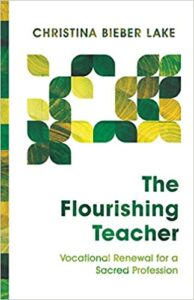 The Flourishing Teacher: Vocational Renewal for a Sacred Profession Christiana Bieber Lake (IVP Academic) $22.00 – OUR SALE PRICE = $17.60
The Flourishing Teacher: Vocational Renewal for a Sacred Profession Christiana Bieber Lake (IVP Academic) $22.00 – OUR SALE PRICE = $17.60
We have a big stack of these and I was stymied writing about it since I hadn’t had time to study it carefully. I would have promoted it as teaches prepped for the “back to school” season over the summer, but the pandemic kept us from doing that well. Although the book cover or title does not say it — grrr —this book is not primarily written for ordinary teachers of elementary or high school ,but it is about being a college teacher. We have a large section in our store about higher education and several about the calling of being a Christian college prof, and I did not realize this one was one of those sorts. Alas, as I shifted my expectations, I soon enough fell in love with this book. Written by a woman who has taught literature at Wheaton College (indeed, is the Clyde S. Kilby Professor of English there) but who also has been a teacher in K-12 settings, she knows what educators go through. She believes deeply it is a sacred profession to which some are called. But, as she starts the book (down with the flu and terribly discouraged) she set out to write a book for those who may be burned out by the “relentless pace, the overload of classes, the grading, the advising, the additional committee work.” Sound familiar?
Dr. Lake is a remarkably learned woman. Her stunning, scholarly work Beyond the Story: American Literary Fiction and the Limits of Materialism (University of Notre Dame; $45.00) explores the deepest worldviews and assumptions about life (and the reality of metaphysics) in contemporary fiction. She has a stellar book on St. Flannery, too, called The Incarnational Art of Flannery O’Connor (Mercer University Press; $30.00.) She is a major scholar and has done this high level of academic work, even as she so clearly is a passionate, seasoned professor and teacher.
And, so, The Flourishing Teacher by Bieber Lake offers profound insight and rumination and spiritual reflections and practical advise for any teacher who feels a need to refocus, become renewed, and learn to actually flourish in what can be a draining, hard job. As the back cover promises, she takes on several pressing issues: “How do I balanced work and family time? Where do I fit in time for my research and writing? What particular challenges do female faculty face, and how should they navigate them?”
After an introductory chapter called “A Long Obedience in the Same Direction”, she offers clever and inviting chapter titles that walk a teacher through a year of life. She starts in August, of course, with that mix of excitement and dread, sadness that the summer zoomed by so fast, and yet eager to get thinking about the new school year. What wisdom she offers, how spot-on and relevant. Get this book for any teacher you know, but especially for anyone teaching at the college level. It might remind them why they teach and help them rediscover a passion for their sacred vocation.
Listen to these endorsing blurbs:
“The Flourishing Teacher understands in wonderfully particular and empathetic detail the peculiar rhythms and challenges of the academic year. No matter where you are in your career, you will find winsome and practical advice for thriving in and, as importantly, out of the classroom. Through it all, Christina Bieber Lake is that trusted friend who has successfully navigated scholarship and teaching from whom we all wished we could get advice. Now we can.” — Jennifer L. Holberg, professor of English at Calvin University, founding coeditor of the Duke University Press journal, Pedagogy
“What a wonderful, invigorating, and encouraging book! I recommend it to anyone committed to the ‘spiritual work’ of college teaching. With honesty and confidence born of long experience, the author shares her vocational journey through the form of the academic year. Along the way, she offers splendid, practical wisdom while sustaining a graced tone of gratitude. The Flourishing Teacher is a vital addition to any professor’s ‘soul shelf,’ but especially those of us who teach at church-related schools.” –Paul J. Contino, Pepperdine University)
Brutally honest, eminently practical, and wonderfully snarky, this book might save your teaching career, your joy in your vocational calling, and even your marriage. It is a true masterpiece of personal, pedagogical, and professional wisdom. I wish I’d had this volume before I completed my graduate degrees. I would have been much healthier, happier, and productive. Read this from cover to cover immediately, and then month-to-month starting before the-month-that-shall-not-be named. Join the company of Eager Biebers!” –C. Ben Mitchell, Professor of Moral Philosophy at Union University
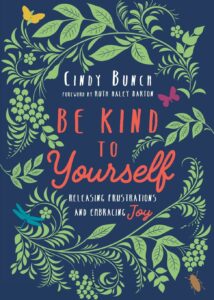 Be Kind to Yourself: Releasing Frustrations and Embracing Joy Cindy Bunch (formatio/IVP) $15.00 – OUR SALE PRICE = $12.00
Be Kind to Yourself: Releasing Frustrations and Embracing Joy Cindy Bunch (formatio/IVP) $15.00 – OUR SALE PRICE = $12.00“There is a sweet space where wisdom and innocence meet in the relationship between those who have given themselves to the rhythm of spiritual formation for a long time and those whose commitment is new. Cindy Bunch found it and then set the table for all of us to come together, using the same practices, to explore who we are in God and who we can become.”–Suzanne Stabile, author of The Path Between Us and host of The Enneagram Journey podcast
Cindy Bunch knows lots about the best authors and works in the field of spiritual formation and she understand deeply the stuff about the true self. She knows what it means to attend to “the frustration that bug us in order to identity negative thinking about ourselves or others.” Yep, this is a lovely little volume that is deeply rooted in the old, old work of letting go of sin and false stuff and living into our union with Christ. It is about Ignatius and discernment and self knowledge and Godly inner transformation and deeper, sane discipleship. She cites oodles of great stuff, surprising stuff, and has lots of practical sidebars and prayer ideas and appendices for various types of folks. There are drawings and little charts and art reproductions and few photographs, that are fun and funny. Each short chapter is about a certain thing that may bug you, and how that can lead you, if brought before God and surrendered to Christ’s transforming grace, to wholeness and joy.
So. This absolutely not a simplistic, cheery little self help book about taking care of yourself in a way favored by our shallow consumer culture. Not at all. It is about radical transformation, serious inner work, listening well to your life. But it may be in the guise of a cheery little self help book. What’s not to love — this book is fun and fantastic and I highly recommend it. If only I can get through more of the letting go, and letting God. I’m sure this will help. You too, I bet.
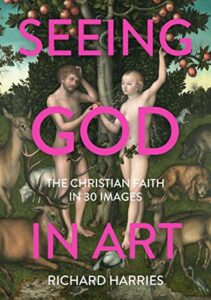 Seeing God in Art: The Christian Faith in 30 Images Richard Harries (SPCK) $22.00 – OUR SALE PRICE = $17.60
Seeing God in Art: The Christian Faith in 30 Images Richard Harries (SPCK) $22.00 – OUR SALE PRICE = $17.60
Oh my, I just can’t wait any longer to tell you about this book that released here in the States in March 2020. Yes, back then. It is from the UK and we were so excited to promote it at all our various events this past Spring and Summer, we just knew it would be a big hit if people picked it up and took a look. Alas, we can’t slip it into your hands and invite you to behold, so we’ve been waiting to explain it’s glories. This is a great little book, a great price, and very, very formative and informative, for hearts and minds.
Two of our favorite little books and best-sellers for us in their respective seasons are The Art of Advent: A Painting a Day from Advent to Epiphany (by Jane Williams) and The Art of Lent: A Painting a Day from Ash Wednesday to Easter (by Sister Wendy Beckett.) Both are from SPCK in England ($16.00 and $17.00, respectively.) This new one is sort of like those but bigger in size and has fewer entries, but more text. Let me explain.
What this book does is try to offer what might be called an introduction to Christian thinking, with entries on the basics of Christian theology, each explored by way of a famous painting. Over the centuries, of course, some of the world’s greatest painters and sculptors have been people of deep faith and their artwork reflected this. (See the forthcoming re-issued 75 Masterpieces Every Christian Should Know by Terry Glaspy for more great examples of that, including music, and literature as well.) So, Seeing God in Art “holds up a lens through which you can enhance your appreciation of Christian art and the wonders of Christianity itself.” Yes, it is less about finding “God” in the art, but deepening our understanding of Christian faith by way of this authors reflections on these paintings.
There are pieces here by Rembrandt and da Vinci and Caravaggio and Fra Angelica, of course. There are modern pieces by Marc Chagall (on the Exodus) and Stanley Spencer’s famous one of Jesus holding the deadly spider “The Scorpion” from 1939. It is remarkable seeing early church mosaics and 14th century Russian icons and medieval tapestries from Europe next to Nicholas Mynheer’s 2003 vivid “The Spirit Descends to Live within Us” from the Worcester College Chapel on Solomon Raj’s scratchy black and white etchings from 1995. I did not know of Ceri Richards nor his “The Supper at Emmaus” from 1958 but I’ve pondered it on and off for months, now.
The author’s pick of paintings may not be yours, but that is most of the fun. His pick of the thirty things to write about, too, may not be reflective of your deepest theology, although it’s fairly standard stuff. Some will adore his clear-headed, basic sense of God, creation, humans, fall, scenes of the Old Testament and the gospels, Christ’s life, death, resurrection, and scenes of the Spirit come and the church charged with power to serve. I had my own wishes — especially for one last painting reflecting on the cosmic healing of the created order (perhaps at least how Francis Schaeffer described the landscapes (including the rich and poor) in Van Eyck’s “Adoration of the Lamb” in How Should We Then Live.) Nonetheless, Rev. Harries has modeled for us how to see theological truth in mostly pretty overtly religious paintings.
We heartily recommend Seeing God in Art: The Christian Faith in 30 Images. We hope you order it at our 20% discount.
It brings to mind (I must say, in passing) the extraordinary and rare little book that we stock by Calvin Seerveld entitled On Being Human: Imaging God in the Modern World (Welch Publishing Company; $6.99) where Seerveld reflects in about 100 pages on both old and some very contemporary art pieces to explore the meaning of being human — created in the image of God, fallen, in need of adoption, made into priests, put into neighborhoods, pregnant with redemptive possibility, and more — including fresh translations of Scriptures (his own) and contemporary songs to joyfully sing, humanly.
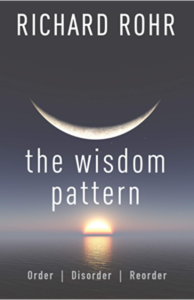 The Wisdom Pattern: Order/Disorder/Reorder Richard Rohr (Franciscan Media) $18.99 – OUR SALE PRICE = $15.19
The Wisdom Pattern: Order/Disorder/Reorder Richard Rohr (Franciscan Media) $18.99 – OUR SALE PRICE = $15.19
I suppose if you’ve read BookNotes for long you may know that we have found it exceptionally helpful to think of the overview of the major chapters of the Biblical story as what we sometimes call creation-fall-redemption-restoration. Al Wolters in his exceptionally wise introduction to what is meant by a Christian worldview, sort of a pre-theoretical philosophy of life called Creation Regained helped outline this for many. So did Brian Walsh & Richard Middletown in Transforming Vision. Both books were written in and for communities of faith of which Beth and I were somewhat a part in the 1970s. The phrase has been tweaked and nurtured, advanced and explored — in little books and big ones, from lesser known authors to leaders like N.T. Wright. You may know the campus ministry organization that we work with a bit called the CCO (Coalition for Christian Outreach) runs their big Jubilee conference each February and the four keynote presentations are exploring the Biblical doctrines of creation, fall, redemption, and restoration. It was somewhat in that context that our friend Lisa Sharon Harper wrote her book The Very Good Gospel: How Everything Wrong Can Be Made Right in which she brilliantly uses other images and words drawn from Genesis and the subsequent Biblical drama. In her good hands, she writes about shalom/alienation/reconciliation. Faith and Christian conversion is a sort of homecoming, not just a reverse of the curse, but a healing of the alienation. We become agents of cosmic reconciliation in all areas of life.
Well, this is a long way of introducing these familiar themes that find their way in yet another iteration in the recent overview of the spiritual life written by Father Richard Rohr, a contemplative mystic, a social justice-activist and a rather progressive contemporary theologian that has this ancient-future vibe. (See, for instance, his fascinating, if not fully adequate, study of the Holy Trinity in his The Divine Dance: The Trinity and Your Transformation, which I did a long review of when it first came out in 2016.) We respect Rohr a lot and while we have recommended some of his mystical volumes about contemplative prayer (and his ones about justice and cultural transformation) we’ve been unsure of the fidelity to the best orthodox theological traditions in some of his recent works. (I have often said I both love and disagree with much in his recent Cosmic Christ which, though at times theologically sloppy, properly reminds us that Jesus the Christ is not merely a personal buddy or savior of our souls or even only Lord of the church, but the redeemer of all things, King of creation itself, which he made, sustains, and is redeeming, every square inch of it. Yes, yes, yes – just think of the grand hymn “All Creatures of Our God and King” and sing Hallelujah. As a Franciscan, he gets that and some of his eloquent and provocative writing is a gift to the wider church who needs reminded of these basic Biblical truths.)
Which leads us to this new book that I am inclined to like very much as it gets at this gospel-centered “once-good, now fouled up, and being made new” — that is, creation/fall/redemption or shalom/alienation/reconciliation — way to explain the Christian faith. The incarnate Son of God comes to earth to defeat evil so that was once good can be reclaimed and restored. My ears obvious perk up when I hear Roh talking about “order-disorder-re-order.”
It also reminds us of Walter Brueggemann’s helpful summary of the three kinds of Psalms, those of orientation, disorientation, and re-orientation.
Allow our mystical creation-oriented Franciscan brother to lead you through this flow of episodes that keep appearing and reappearing in your life. Things that are orderly get screw up; things that are bad get reformed. We move from order to disorder to a new order often without seeing it, and if we are attentive, we can discern God’s hand in it all. I believe that. Rohr insists that seeing God’s hand in the pattern (indeed in yielding to it) is what it means to be wise. Hence, this is the “wisdom pattern.”
It makes sense. There are those unrealistic who make a fetish out of order, who cling to the old ways, to control, who can’t stomach change or renewal. There are those who are so realistic that all they can do is lament the disorder, stuck in brokenness in ways that lead to cynicism or despair. There are those who want God’s redemption in ways that do not re-order things, but just want God to bless whatever they are used to, no believing Isaiah who says we will “sing a new song.” So we can and do get stuck (personally, communally, institutionally, culturally) in either of these three “chapters” of the story, these three phases of our life’s episodes.
This may be too mystical for some, or, more likely, like overblown psychobabble to others. But I think he is on to something here, articulating in this helpful pattern, something we know happens, something we’ve experienced, and something that might just make us wiser if we enter into being intentional about it all.
In the introduction, Fr. Rohr says,
“Knowing the full pattern allows us to let go of our first order, trust the disorder, and, sometimes even hardest of all – to trust the new reorder. Three big leaps of faith for all of us, and each of a different character.”
This 199 page book is jam packed with quotes from everybody from Dons Scotus to Carl Jung, from St. Bonaventure to John Calvin, from Francis of Assisi to Peter Berger of Boston, making it creative (if a bit impressionistic, frustrating to serious theologians or historians, I suspect) but ends on the notes of hope, rebuilding, what he calls being a reconstructionist. Embrace the new order, a healing of the disorder, and be wiser, even as God is working all around us to bring upon us His resurrection new life.
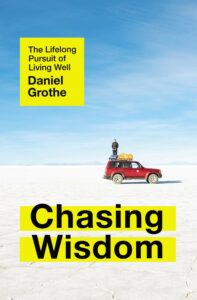 Chasing Wisdom: The Lifelong Pursuit of Living Well Daniel Grothe (Thomas Nelson) $24.99 – OUR SALE PRICE = $19.99
Chasing Wisdom: The Lifelong Pursuit of Living Well Daniel Grothe (Thomas Nelson) $24.99 – OUR SALE PRICE = $19.99
Speaking of wisdom. It’s fascinating to me that there is such a large body of work of books that we have about the wisdom literature in the Old Testament, good stuff (like the new Calvin Seerveld book on reading Proverbs) in the commentary section. But books about just being wise in life, prudent and Biblically insightful, day by day? Not so much. This book has a very different approach and feel than the Richard Rohr one, above. Grothe is a very popular, upbeat, pastor at the multi-site, evangelical community church (New Life in Colorado Springs.) Their senior pastor, Andrew Arndt, just published a great book called All Flame: Entering Into the Life of the Father, Son, and Holy Spirit (NavPress; $15.99) and if Grothe is connected with that guy, I’ll read him.
Some fairly big names in the reasonable, Spirit-driven, moderate, evangelical world endorse this — Peter Greig (of the 24/7 Prayer movement) says it is “fresh, countercultural, provocative, and urgent.” Ken Costa, chairman of Alpha International (who wrote a great book on faith in the marketplace called God at Work and one a little more foundational called Know Your Why) says it is “a compelling read.” He would know. Glen Packiam, another well respected writer who is a New Life pastor says of Grothe,
A poet with his prose and a pastor who understands the care of souls, Daniel is a perfect guide to the critical quest for wisdom in our age.
But here is something that is more important. He was befriended by Eugene Peterson. You can tell from the footnotes that he is drawing on the rich and deep tradition of the church fathers, the desert mystics, and contemporary folks from poet Mary Oliver to Presbyterian Frederick Buechner. No exactly what we used to expect from megachurch preachers, right? He guides his readers towards Peterson — a sage that means a lot to Grothe — and I believe he knows Eugene’s work well. Daniel Grothe is a good communicator and a clear, conversational writer. And it offers insight into this topic which we all need to be nurtured in and which there are not an abundance of useful books. This came out in April, and I only wish we could have highlighted it sooner. Don’t miss it now.
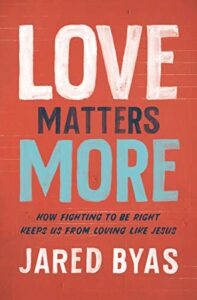 Love Matters More: How Fighting to be Right Keeps Us From Loving Like Jesus Jared Byas (Zondervan) $18.99 – OUR SALE PRICE = $15.19
Love Matters More: How Fighting to be Right Keeps Us From Loving Like Jesus Jared Byas (Zondervan) $18.99 – OUR SALE PRICE = $15.19
It seems to me that for those wanting a wise way to engage our neighbors or fellow church members (or family members) it is always, always, wise to realize just what this book says — love is the way to go, love is the answer, the greatest of these is love. Am I right? Of course. God is love, after all. Well, how, then, do we argue, how to we try to persuade others, how to we live in conflict? How does this work out. This book gets at that in a way that is enjoyable to read but, in fact, offers more than a pleasant call to civility. It’s a bit more meaty than that.
The back cover of Love Matters More says this is a “new vision of the Christian life, built not on being right but on loving our neighbors.” Well, (in love) I’d say that’s not so new. But, boy, is it important to be reminded of. No matter what side of the political isle your’re on these days, or what kind of church, or what religion tradition you are in, yes, we simply must take this to heart. We need a witty and strong, and solid author to lead us deeper into a gospel-centered, grace-based view of how to live out the truth in love.
This author is fabulously interesting and very entertaining. That helps. He is cohost of the popular podcast “The Bible for Normal People” and co-author with Pete Enns of Genesis for Normal People. He knows a lot about the ancient Jewish ways of understanding, what some might call the Hebrew worldview. He attends a Mennonite church outside of Philly and and I suppose you’ll dig that he named his kids Augustine, Tov, Elletheia, and Exodus. So there’s that bit of love right there.
Which is to say, as this book makes clear, love doesn’t have to be a least-common- denominator can’t-we-all-get-along session of Kumbaya and white bread. The heart of the Bible is itself a messy, even painful story and it is one about truth. Indeed, truth matters. But — get this, as it is a key to the book — Biblically speaking, truth must be incarnate, lived, real. Drawing on important stuff about the very nature of truth in the Bible — think of his buddy Pete Enns’s Sin of Certainty, which explores the very Biblical notion that God is less interested in correct beliefs than trust and relationship and approaches the complexities of what philosophers call epistemology (that is, knowing) — Byas here explores some great insights for living truth in love. Living the truth in love. Wow.
The back cover says this book is for “anyone who has ever felt forced to choose between truth and love, acceptance and rightness.” It offers a path beyond endless debates about who is right towards a love that matters more. And he does with with a light touch, some signature wit, and, yes, a deep desire to help people experience the truth.
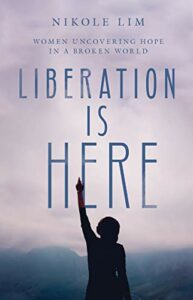 Liberation Is Here: Women Uncovering Hope in a Broken World Nikole Lim (IVP) $25.00 – OUR SALE PRICE = $20.00
Liberation Is Here: Women Uncovering Hope in a Broken World Nikole Lim (IVP) $25.00 – OUR SALE PRICE = $20.00
Those who know about or follow the work of Gary Haugen and the International Justice Mission, one of the first and best of the NGOs fighting sexual trafficking, or Hope International (the Lancaster-based anti-poverty ministry that works in micro-loans and encouraging entrepreneurship in the developing countries) you may know of this amazing woman, Nikole Lim. She is a visionary, consultant, storyteller, researcher, and cofounded Freely in Hope which describes itself as a nonprofit “seeking to restore dignity to survivors of sexual violence by providing educational opportunities and platforms for women to fulfill their dreams.” She is amazing.
It is said of her own storytelling that she “shifts paradigms on how stories are told by platforming voices of the oppressed—sharing stories of beauty arising out of seemingly broken situations.” Her heart beats for young women whose voices are silenced by oppression and desires to see every person realize the transformative power of their own story.
Oh, and she is a filmmaker.
It should come as no surprise, then, that Liberation Is Here is a book of stories of women (focusing on just three) from Africa told alongside beautiful photographs and pictures — a visual, artful, multi-medium, telling of stories of women whose lives embody a new found hope, resilience, agency and beauty. These are the true stories of how development and transformation and Christian social chance happens, what it looks and feels like, as women (who are not portrayed as victims) become inspiring heros of God’s unfolding story. It shows us the personal side of what a more just and good world could look like, and it tells/shows it powerfully. You will be caught up in the drama and glad for these hours spent with these women.

“Nikole Lim’s Liberation Is Here is the story of three African women, all of them sexually assaulted as children, and their extraordinary journeys to survival, restoration, and leadership. Their unforgettable stories convey the appalling reality of near-total impunity enjoyed by men who rape children. Ms. Lim finds hope in the breathtaking courage of rape survivors whose suffering has compelled them to advocate on behalf of others.” –Gary Haugen, CEO of International Justice Mission
“What a vulnerable, deep, and profound book of hope and hidden beauty! Through the lens of an artist, in powerful and beautiful images, Nikole Lim’s Liberation Is Here stewards the stories of women who have survived abuse and sexual violence. Heart-wrenching and full of trauma, the accounts of violations against women are not the end of the story. Rather, Lim walks the reader through a transformative journey of joy and profound pain in the quest for liberation from sexual violence and oppression. Liberation Is Here describes a mutual process of transformation and liberation where our individual freedom is bound up in the stories, pain, and the triumph of others’ quests for redemption and healing. Lim describes how healing and transformation parallel the story of Jesus through joy and pain, death and rebirth. May all who read Liberation Is Here experience the binding power of our common humanity as we hold onto hope and seek mutual healing and justice.” –Mae Elise Cannon, author of Social Justice Handbook and Beyond Hashtag Activism, executive director of Churches for Middle East Peace)
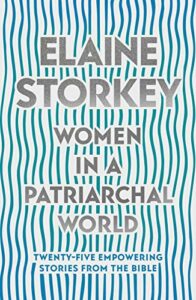 Women in a Patriarchal World: Twenty-five Empowering Stories from the Bible Elaine Storkey (SPCK) $15.00 – OUR SALE PRICE = $12.00
Women in a Patriarchal World: Twenty-five Empowering Stories from the Bible Elaine Storkey (SPCK) $15.00 – OUR SALE PRICE = $12.00
A new book by Elaine Storkey? Of course we will order it (even though our distributor has to get it in from the UK.) Elaine is a British scholar – activist who has worked with all sorts of organizations and ministries we’ve admired, from Toronto’s Institution for Christian Studies to John Stott’s London Institute for Contemporary Christianity for to our beloved CCO Jubilee conference. She has held posts (as they say it across the pond) at Oxford and Kings and has been a visiting professor at Calvin College in Grand Rapids.
Elaine Storkey is just an amazing person. She was president of the excellent, wholistic relief and development agency Tearfund and has served for decades on the General Synod of the Church of England. As a trained sociologist and philosopher and a journalist and broadcaster she has learned to speak well into the complexities of social disorder and injustice and offer a lively, Biblical, just vision for God’s shalom. Her last book was Scars Across Humanity: Understanding and Overcoming Violence Against Women which was honored in 2019 as a “best book” not only by us here at Hearts & Minds but by Christianity Today.
What can we tell you about this? It is simple, Women in a Patriarchal World is actually a set of 25 chapters, each fairly brief, offering a retelling and exploration of woman from the Bible. There are 11 from the Older Testament, the rest from the New. As she faithfully teaches from the Scriptures, the last two or three pages from each chapter offers insights about what she calls “Facing Our Challenges Today.” And then there are two discussion questions to ponder about the text and it’ application today. With maybe a little ingenuity with a third or four question, this would make a fabulous book to read through in your small group or Bible study. As her credentials above may show, she’s smart and astute, but these are not academic studies, but sermonettes, reflections, solid but very inspiring. Perfect for personal reading or for groups or classes.
As Henrietta Blyth, of Open Doors UK & Ireland, writes,
In Elaine Storkey’s wise, compassionate and scholarly hands, these familiar stories erupt like gentle fireworks, bringing fresh illumination, excitement, colour, and impact.
Yes, indeed, gentle fireworks! Except some of the people and episodes may not be that familiar to some readers. That the men who compiled our sacred Scripture included these many women is pretty astonishing, and that they remain God’s Word to us is vital. We’re grateful for Storkey’s work immersing us more deeply into Biblical truth.
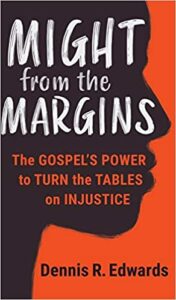 Might from the Margins: The Gospels Power to Turn the Tables on Injustice Dennis R. Edwards (Herald Press) $16.99 – OUR SALE PRICE = $13.59
Might from the Margins: The Gospels Power to Turn the Tables on Injustice Dennis R. Edwards (Herald Press) $16.99 – OUR SALE PRICE = $13.59
It’s so annoying to us seeing a big stack of books that we were so enthused about when we ordered them more than a half a year ago, only to realize we haven’t been able to show them off at a conference or hand-sell them to browsers in the store. Our store is a mess with such stacks and one that I’ve been itching to tell you about for a while, now, is this important one by Dr. Dennis Edwards, a professor of New Testament at North Park Theological Seminary. I like his little What is the Bible and How Do We Understand It in the recent The Jesus Way Series (a series of pocket sized books with an edgy Anabaptist-ish perspective.) I used Dr. Edward’s great hardback commentary in the “Story of God Bible Commentary” series when I was co-leading a Zoom Bible study this summer on 1 Peter. That letter, written to exiles, came alive reading the evangelical commentary about it written by this black man. It was helpful, to say the least.
Now Edwards has this new one — well written, provocative, clear-headed, solidly Biblical. Why do we sometimes not notice all the good stuff that happens in the Bible from the margins, the outcasts, the fringes. (I’ve been praying for months, now, the Magnificat (Mary’s Canticle from Luke 1) every Sunday night in a little Zoom prayer service and I wonder when it’s upside down clarity will stop being jarring to me?) Why do we sometimes miss how those who are excluded become vital — just think of the end of Jesus’s first Jubilee sermon in Luke 4 and how the inclusion of the hated outsiders nearly got him killed. What would our hospitality and outreach be like if we were more welcoming of outsiders, of those different and despised?
But, more to the point of Might from the Margins, Mr. Edwards asks us to wonder what the church itself would be like if marginalized Christians helped the church become more transformed?
Nicole Baker Fulgham, founder of a project to help churches help schools with at risk populations (The Expectations Project) and author of Educating All God’s Children, says that this book,
Lays out a much-needed theological framework that both explores and celebrates the power of marginalized communities.
Listen to Drew Hart, professor of theology at Messiah University, author of Who Will Be a Witness? Igniting Activism for God’s Justice, Love, and Deliverance who says it is “A compelling vision forward, grounded in Scripture and God’s delivering presence for those with their ‘backs against the wall.'”
Jim Wallis of Sojourners and the recent Christ in Crisis?: Reclaiming Jesus in a Time of Fear, Hate, and Violence says, quite simply, that Might from the Margins is “A powerful, inspiring book.”
M from the M opens with a chapter on the power of God which is very good — this dude can preach! — and then highlights, chapter by chapter, the power of a diaspora people, the power to discern injustice, the power of prophecy, the power of anger, the power of solidarity, the power of worship, the power of hope, and the power of the Spirit. The last chapter? “The Power of Love.” Amen.
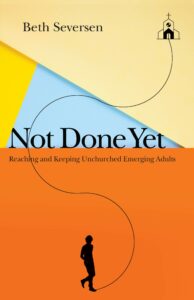 Not Done Yet: Reaching and Keeping Unchurched Emerging Adults Beth Severson (IVP) $18.00. OUR SALE PRICE = $14.40
Not Done Yet: Reaching and Keeping Unchurched Emerging Adults Beth Severson (IVP) $18.00. OUR SALE PRICE = $14.40
We keep a large section of books about reaching young adults, about campus ministry, about congregational life that is attentive to the “emerging adults” as the scholars call the college and post college age group. Their journey isn’t just beginning, but there is this specific era that is potent– the critical years, some call it — for 20-somethings. And these days, many are called “the nones” (those who check “none of the above” in the census or other surveys when asked to chose a faith or religion. (And then there are the dones who perhaps grew up in church but have moved on, who are so “done with that.”) Why are younger adults increasingly nones and dones? Beth Severson, Director of the Center for Christian Ministries and Practical Theology at North Park University in Chicago, (and previously director of evangelism for the Evangelical Covenant Church), set out to do new research to figure more of this out.
In Not Done Yet — get the title’s allusion? — she shares the insights gleaned from this extensive research and outlines a model for how to engage and retain millennials and Generation Z in the life of the local church.
We have lots of the older go-to titles including 2019’s must-read Faith for Exiles: 5 Ways for a New Generation to Follow Jesus in Digital Babylon by David Kinnaman (Baker; $21.99) and another that came out in the March 2020, Welcoming the Future Church: How to Reach, Teach, and Engage Young Adults by Jonathan Pokluda (Baker; $17.99) Let us know if you need other sorts of titles on this topic.
Not Done Yet: Reaching and Keeping Unchurched Emerging Adults by Ms Seversen really is an extraordinary book. I highly recommend it. It is so interesting, well-written, creative and theological and practical, too. It has gotten truly great reviews. Please, please, read these commendations and then think to whom you could recommend this book. Or better, buy it for somebody at your church who might start a book club or new initiative to explore this good, good material. You won’t regret it.
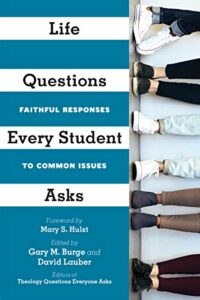 Life Questions Every Student Asks: Faithful Responses to Common Issues edited by Gary Burge & David Lauber (IVP) $22.00 – OUR SALE PRICE = $17.60
Life Questions Every Student Asks: Faithful Responses to Common Issues edited by Gary Burge & David Lauber (IVP) $22.00 – OUR SALE PRICE = $17.60
Well, speaking of college age folks, the students referred to in this recent volume are not high-schoolers. Although I suppose it might work with those who are mature and somewhat sophisticated in their faith and cultural development. But, no, this book really is designed for those who work with young adults, or to be read by college students. We ordered a bunch hoping we’d be with our friends and colleagues at the CCO sometime this fall, or get to talk about it at some gigs we do some places where there are churches who care about college ministry. We love other para-church groups, too, that work on campuses, like IVCF, Cru, Navs, DiscipleMakers, RUF, the Newman Centers, the Baptist Student Unions, Chi-Alpha, and others. (CCO is pretty unique in that they partner with local congregations since involvement in the institutional church is essential in their model of campus ministry.) Anyway, Life Questions Every Student Asks would be a great read for anyone on staff of campus ministry organizations or church leaders who work with college and career age emerging adults. It would be swell to share with students, themselves since that is who it is written for.
The forward, by the way, is by Mary Hulst, the chaplain at Calvin University in Grand Rapids. Both the editors are themselves college teachers and know college students well; most of the authors teach at Christian colleges or have other direct involvement with college students.
This book covers twelve key questions about faith and discipleship and the chapters are by twelve different thoughtful evangelical leaders; as I’ve said, most are teachers at Christian colleges or universities. A few of the writers have published — Beth Felker Jones does the chapter on sexuality; Margaret Kim Peterson does the marriage chapter. Keith Johnson has the chapter on doubt. Most are authors I don’t know well, but their chapters are beautifully written, thoughtful, engaging, and helpful. As you can see below, it includes practical questions about things like: what does it mean to be in community? How can I discern my vocation? Who do I relate to money and power? What if I doubt my faith? How should I approach other religions?
Overall I give this a big, big thumbs up and a few of the chapters are fantastic.
The twelve chapters include:
1. Community and Friendship – Gary M. Burge
2. Vocation – Ben Norquist
3. Gender Roles – Emily Hunter McGowin
4. Sex – Beth Felker Jones
5. Marriage – Margaret Kim Peterson
6. Church – Amy Peeler
7. Wealth and Power – James G. Huff Jr.
8. Suffering – David Lauber
9. Doubt – Keith L. Johnson
10. Counseling – Elisha Eveleigh
11. Religious Pluralism – David Capes
12. Activism – Matt Vega
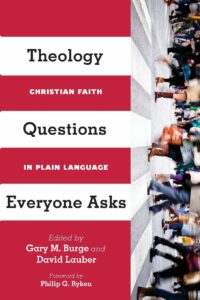 those topics are shaped by the real-life experiences of those writing, and the clear compassion that permeates the engagement combine together to make this a must-read book for college students, twenty-and- thirtysomethings, and those well beyond.” –Kristen Deede Johnson, dean and professor of theology and Christian formation at Western Theological Seminary, author of The Justice Calling
those topics are shaped by the real-life experiences of those writing, and the clear compassion that permeates the engagement combine together to make this a must-read book for college students, twenty-and- thirtysomethings, and those well beyond.” –Kristen Deede Johnson, dean and professor of theology and Christian formation at Western Theological Seminary, author of The Justice CallingBy the way, just so you know — if any of you grown ups wish you had a book just like this, fear not. We stock their very impressive Theology Questions Everyone Asks: Christian Faith in Plain Language (IVP; $20.00.)
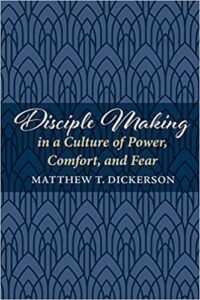 Disciple Making in a Culture of Power, Comfort and Fear Matthew T. Dickerson (Cascade) $20.00 – OUR SALE PRICE – $16.00
Disciple Making in a Culture of Power, Comfort and Fear Matthew T. Dickerson (Cascade) $20.00 – OUR SALE PRICE – $16.00
This book came out in early June and given the Covid complications in our supply chains and the publishing world, we didn’t have it right away. But it arrived soon enough, and we were thrilled; just thrilled. Matthew is a distant friend — he was raised working in his parent’s creatively stocked, thoughtfully indie Christian bookstore so he is one of a small network of people who understand us as much as anyone. And we’ve adored his many books — from stellar works on literature (From Homer to Harry Potter) and scholarly tomes on the ecological vision of both Tolkien and Lewis — both on Kent State University Press. He has a few books about fishing and the glories of streams; he has some self published fantasy novels that we stock. His Mind and the Machine was one of the first books Brazos published and was ahead of its time, reflecting on what it means to be human in an age of automation and technology. He’s a reader, a lit lover, and outdoorsman and Christian ecologist. He’s worked with the Christian fellowship group (with IVCF) at Middlebury College in Vermont where he teaches. He has lectured widely on the Lord of the Rings books and he’s does it so, so well. And now, this.
This is a book about what we might call Christian mentoring or evangelical spiritual direction or, as the title puts it, the making of disciples. More loosely, it is about pastoring, about caring, about helping others in their journey of faith. Whether you are a church educator or a campus minister, a teacher or older friend to younger Christians, this is one of the many, many books on disciple-making, many that are very useful and important, but one that is unique. It explores disciple-making as a whole-life project — not just one’s “spiritual” life, but all of life — and it does so quite aware of the idols and ideologies of the Western culture in which we find ourselves.
Ahh, yes, this is it. We need to move ministry from head to heart to hands and feet, realizing we are what we love and our loves must be renewed in the way of Christ. That is, he gets the most profound stuff within the faith-formation literature. And we have to do all this whole-life mentoring under the Lordship of Christ across all sides of life within the culture we find ourselves in.
Do you get the subtitle? Matthew uses his literary and cultural awareness to pin-point for us the stress points, the danger zones, of living in our modern world. There are other idols and obstacles to a faithful discipleship with Jesus, but he focuses on three: our idolatry of power, our need for comfort, and our culture of fear. Oh, my. Nobody has done this and we should be grateful for this contextualized vision of wholistic discipleship. Preachers, teachers, campus ministers, parents, disciple-makers of all sorts should get this book and ponder it carefully.
When my friend Steve Garber recommends a book — and he is discerning about what he so publicly endorses, more than I am, I’d say — it makes it a no-brainer decision to read it. If Steve advises us to read something, we should. Listen to his lovely and inviting comments about Matthew’s book here:
“Like the best words always are, ‘apprentice’ is rooted in the generations before us, making sense of the way we learn. At its heart it is about binding oneself to someone who knows more. In reading Matthew Dickerson we are drawn into his long apprenticeship to J. R. R. Tolkien, the master story-teller whose moral imagination shapes every soul who enters into his world of hobbits and their ways. But the thread that weaves this tale is about learning to learn to follow Jesus — not the pursuit of the power of a ring — and therefore a pilgrimage in the imitation of Christ, of binding ourselves to the truest truths of the universe.”
–Steven Garber, author of Visions of Vocation: Common Grace for the Common Good and A Seamless Life: A Tapestry of Love and Learning, Work and Worship,
Whether you love Tolkien as Matthew Dickerson and Steve Garber do, you should consider this important little book. In an age of individualism and consumerism, of temptations and shallowness, we need these kinds of good words. It shouldn’t surprise us that Matt opens the book with an epigram from the late Eugene Peterson from his book The Jesus Way. It is dedicated to the memories of Eugene and Janice.
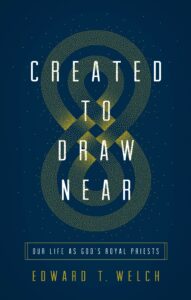 Created to Draw Near: Our Life as God’s Royal Priests Edward Welch (Crossway) $17.99 – OUR SALE PRICE = $14.39
Created to Draw Near: Our Life as God’s Royal Priests Edward Welch (Crossway) $17.99 – OUR SALE PRICE = $14.39
This is yet another book we ordered a good handful of months ago with plans to highlight it at an event, an event that was long ago cancelled. I sure hope some of our BookNotes readers know Ed Welch, author of the powerful Shame Interrupted: How God Lifts the Pain of Worthlessness and Rejection, another so many of us need, Running Scared: Fear, Worry, and the God of Rest, and the popular, punchy book about the idolatry that lurks under co-dependency, When People Are Big and God Is Small. I love the title What Do You Think of Me And Why Do I Care? He is a Bible-based counselor who writes about grace but who some find a bit tough; he knows a bit about anger and fear and shame and addictions and our other all-to-human foibles. (Okay, that’s my word: he calls ’em sins.) But he also knows this: that we were created to rule the creation with Christ, that we are adopted as beloved children of a very good God and turned into His priests! Yes, yes, this is majestic, glorious Biblical material that we don’t hear responsibly broken open for us very often.
There are few heavy things going on in this engaging, accesible work. First, yes, God is holy. We are called to be holy. Priests have some work in that arena and as we become priests we mediate that to the watching world, to the whole creation. We are made to be royal priests, wired to be in relationship with each other and creation and God, a God who is holy,
So, we need to understand some of this in order to live into our call to be fully human. This fiesty book is theologically solid, yet, because it is so surprising to some, it might seem wild, provocative even. Yet, Welch is a non-nonsense writer, workmanlike and reliable. He will deepen (maybe even change) your view of God and thereby will be transformative about your view of yourself. Yep, that’s how it works. Tozer was pretty right, that the most important thing that determines our view of life is, in fact, our view of God. So Welch starts there. And it leads to all sorts of implications of being made in the very image of a ruling, creating, caring, holy God.
Listen to these two different voices saying something important about this robust book.
“You have your grace books and your older holiness books. At times, they exist in two different worlds. Not for Ed Welch. In a book full of rich insights that link the Old and New Testaments, Welch paints a picture of holiness and intimacy with God that makes you want to be holy. He widens our view of holiness, working to craft it into a vision of beauty. You’ll want to obey after reading this book.”
–Paul E. Miller, author, A Praying Life and J-Curve: Dying and Rising with Jesus in Everyday Life
“When some writers and preachers today suggest that the gospel is only about forgiveness, Ed Welch reminds us that it is also good news that God brings us into a life of holiness.”
–Gerald R. McDermott, Former Anglican Chair of Divinity, Beeson Divinity School
BookNotes

SPECIAL
DISCOUNT
20% OFF
ANY BOOK MENTIONED
+++
order here
this takes you to the secure Hearts & Minds order form page
just tell us what you want
inquire here
if you have questions or need more information
just ask us what you want to know
Hearts & Minds 234 East Main Street Dallastown PA 17313
read@heartsandmindsbooks.com
717-246-3333
